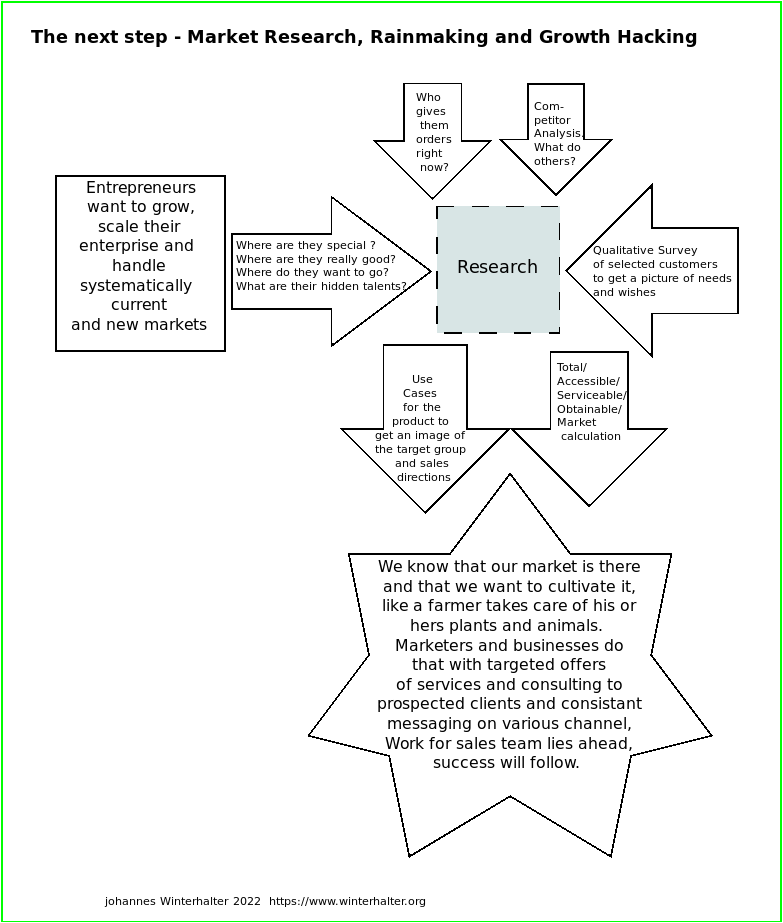This post is also available in:
 English
English  Français (French)
Français (French)  Deutsch (German)
Deutsch (German)
This article is a short introduction into the many names for the same processus: shoveling new clients into the sales funnel of the enterprise and make everybody happy there.
At the end of the article I add my recipe for lead generation. It works.
Rainmakers are salespeople who use techniques not directly visible to outsiders to acquire new customers. Rainmaking and market research go hand in hand.
Who looks for Growth Hackers and who for Rainmakers, and who needs Lead Generation?
Growth Hacking is made for start-ups.
They want exponential growth here. That could double weekly sales. Growth hacking also works for traditional companies that can expand their production fast enough and still grow their market. They only need to find a market.
Growth hackers are people who achieve such sales growth using methods that are not directly visible and easy to conceive for the environment. This gives their work something magical.
Rainmaking
Rainmakers are more traditional. They have an approach to sales not used in the enterprise beforehand, sometimes they also change the product line. This looks like magic to the employees in the enterprise. They may do own market research or user the services of professional market research analysts.
Lead Generation
Everybody who wants to sell something needs Lead Generation. This is just looking who might be customer, which are cold leads, and stay in contact with the ones who are interested. These are warm leads, and some of them may turn to customers.
Extraordinary skills of the growth hacker
He sees unfulfilled human needs. She or he tests that in niche markets there it is possible to see how well a product is being received. Market research can test new products with well-known techniques, for example group discussion or sending out samples and questioning later.
According to Henry Ford, market research and customer suggestions were not the impetus for the development of the then revolutionary Model T, which was built in huge numbers. Customers would have wanted faster horses instead of cars they had never seen before. Growth Hackers and Market Researchers need to be visionaries to see the new product in his best shape.
Growth hacking is referral marketing
Inexpensive and fast customer acquisition cannot circumvent recommendation marketing. People recommend a product to others if it has helped them or arouses enthusiasm. Or if they can earn money with the recommendation.
Free trial access, distribution of samples, influencers, trial lessons, presence on social media – a lot helps a lot, like Germans like to say.
Outdated business models – leave it behind
People like to think that things who were once successful may be worth reviving or continuing. Market research finds if there is still a market for the product.
Rainmaking, Lead Generation and Market Research work together
Growth hacking is the product of many ideas and numbers. The firm belief in one’s own success is of no use if all market fundamentals oppose it. For example what to do if an analysis of the Totally Accessible Market shows only limited growth opportunities?
The market researcher also knows the penetration and effect of the individual recommendation or influencer channels and can doreliable tests.
Here the Working Recipe
Secret Recipe For Making Leads Rain ---------------------------------------------------------- Who do I wish to be my client Why do I wish them do be my clients Who takes the decisions at my wished client Who buys the stuff I try to sell already regularly Who are my competitors Who takes the decisions at the regular buyers Where is it easier to sell Whats in for my buyers Where can I reach my clients How do my clients like to be reached Additional arguments for my clients to buy Expected costs to find a customer, in percentage of sales
Why doing Market Research in Growth Hacking and Lead Generation?


